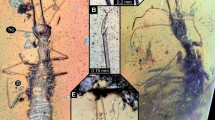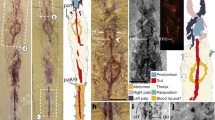Abstract
HUXLEY'S original papers on the anatomy of the Invertebrata extend over a period of about thirty years, from 1849 to 1878. They deal with the most varied subjects, as, for example, the organisation of the Hydrozoa in general and of the Siphonophora in particular; the morphology of Heteropoda and Ptero-poda amongst Mollusca; the anatomy and physiology of the rotiferan Lacinularia, the anatomy of the primitive trematode Aspidogaster, the embryology of the crustacean Mysis and of the parthenogenetic eggs of the Aphididse amongst insects, and finally the anatomy of Pyrosoma, Doliolum, and Appendicularia amongst Tunicata.
This is a preview of subscription content, access via your institution
Access options
Subscribe to this journal
Receive 51 print issues and online access
$199.00 per year
only $3.90 per issue
Buy this article
- Purchase on Springer Link
- Instant access to full article PDF
Prices may be subject to local taxes which are calculated during checkout
Similar content being viewed by others
Rights and permissions
About this article
Cite this article
MACBRIDE, E. Huxley' Contributions to our Knowledge of the Invertebrata. Nature 115, 734–737 (1925). https://doi.org/10.1038/115734a0
Issue Date:
DOI: https://doi.org/10.1038/115734a0
Comments
By submitting a comment you agree to abide by our Terms and Community Guidelines. If you find something abusive or that does not comply with our terms or guidelines please flag it as inappropriate.



